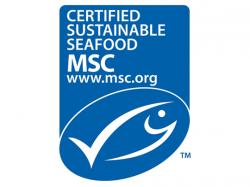Traditional Small Boat Icelandic Lumpfish Fishery Is MSC Certified
January 19, 2015 | 4 min to read

Iceland’s lumpfish fishery has been MSC certified as a sustainable and well-managed fishery. The 330 small boats are the first MSC certified lumpfish fishery in the world.
Lumpfish has been harvested for centuries inside the Icelandic Exclusive Economic Zone. Male and female lumpfish are easily distinguished both in colour and size, where females are larger. The big mesh size gillnets fishery mainly targets the females for their roe, which is exported as a luxury caviar mainly to European countries. There is also a growing Chinese market for the female fish while male lumpfish is less frequently caught, mostly for traditional local consumption.
Stable stocks
The lumpfish distributed between Iceland and Norway is one of three genetically distinct stocks of lumpfish in the North Atlantic. Although some other lumpfish stocks have faced challenges, the Icelandic lumpfish fisheries have been relatively stable since 1990.
The lumpfish fishery is controlled by various measures that include restrictions regarding the number of licenses and nets, a fishing season of three months only as well as limitations on vessel and mesh sizes.
Delicate ecosystems
Icelandic waters contain a wide range of delicate ecosystems, mostly in deep water. The static bottom-set gillnets used in the lumpfish fishery have minimal contact with these ecosystems as the fishery mainly takes place on a rocky sea bed in shallow waters.
The fishery’s main bycatch is the MSC certified cod (Gadus morhua), representing around five per cent of the total catch. All bycatches are landed as discarding is prohibited in Iceland.
A world first
The client, Vignir G. Jónsson hf., was a family run business founded in 1970 but is now a subsidiary of the seafood company HBGrandi. The headquarters and main processing site of Vignir are in the town of Akranes, with a staff of about 40, but they also operate in east coast of Iceland. Vignir CEO, Mr. Eíríkur Vignisson says: “I’m happy that this assessment is now completed. All lumpfish fisheries in N-Atlantic were last year listed as red by many of the eNGO traffic light systems. That was a huge disappointment for the industry but I hope this certification will contribute to the Icelandic lumpfish products falling under the green category. It is important for the industry to be able to demonstrate to overseas buyers that our products originate from a truly sustainable fishery.”
Gisli Gislason, MSC Manager for the North Atlantic said: “Lumpfish roe is an important product for European markets and this is the first lumpfish fishery in the world to get MSC certified. This is the only traditional fishery in Iceland exclusively performed by small vessels. Close cooperation between the authorities and the small boats association is vital to protect the marine environment and ensure lumpfish stocks are stable for the future. MSC certification provides independent reassurance for consumers around the world that the lumpfish roe comes from a sustainable fishery. We hope that this certification will in return incentivise other lumpfish fisheries to enter the MSC program.”
For further information, please contact Gisli Gislason, Marine Stewardship Council on 00354 898 0991 or email gisli.gislason@msc.org
The Marine Stewardship Council (MSC) is an international non-profit organisation set up to help transform the seafood market to a sustainable basis. The MSC runs the only certification and ecolabelling programme for wild-capture fisheries consistent with the ISEAL Code of Good Practice for Setting Social and Environmental Standards and the United Nations Food and Agricultural Organisation Guidelines for the Eco-labelling of Fish and Fishery Products from Marine Capture Fisheries. These guidelines are based upon the FAO Code of Conduct for Responsible Fishing and require that credible fishery certification and eco-labelling schemes include:
- Objective, third-party fishery assessment utilising scientific evidence;
- Transparent processes with built-in stakeholder consultation and objection procedures;
- Standards based on the sustainability of target species, ecosystems and management practices.
The MSC has regional or area offices in London, Seattle, Tokyo, Sydney, The Hague, Glasgow, Beijing, Berlin, Cape Town, Copenhagen, Halifax, Paris, Madrid, Moscow, Stockholm, Santiago, Sao Paulo, Singapore and Reykjavik.
In total, 347 fisheries are engaged in the MSC programme with 249 certified and 98 under full assessment. Another 40 to 50 fisheries are in confidential pre-assessment. Together, fisheries already certified or in full assessment record annual catches of close to ten million metric tonnes of seafood. This represents over ten per cent of the annual global harvest of wild capture fisheries. Certified fisheries currently land over eight million metric tonnes of seafood annually – over nine per cent of the total harvest from wild capture fisheries. Worldwide, more than 25,000 seafood products, which can be traced back to the certified sustainable fisheries, bear the blue MSC ecolabel.
For more information on the work of the MSC, please visit www.msc.org
Source: The Marine Stewardship Council
